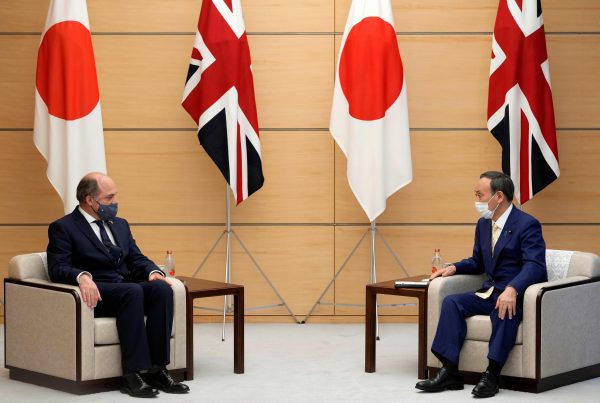Last year, UK Prime Minister Boris Johnson made positive remarks about Japan joining the alliance. Former US deputy secretary of state Richard Armitage also wrote that ‘the United States and Japan should make serious efforts to move toward a Six Eyes network’. Japanese security scholars Richard Samuels and Brad Williams similarly mentioned the possibility of Japan’s participation in the alliance in their recent studies.
Meanwhile, Japan’s ruling Liberal Democratic Party (LDP) published a December 2020 report, ‘Towards Establishing an Economic Security Strategy’, outlining that Japan ‘should seek to join the Five Eyes alliance’. In view of the recent Chinese maritime expansionism in Southeast Asia, a regional ‘handshake’ between the Five Eyes and Japan seems inevitable. Yet specific talks have not progressed at all.
After the Second World War, the Japanese government refrained from establishing a robust intelligence community because Japanese public opinion opposed stepping into the dark world of intelligence. At the same time, Japan could depend on US intelligence during an emergency. This prevented the establishment of an overseas intelligence apparatus, like the CIA or MI6, making it difficult for Japan to contribute any HUMIT intelligence to the Western security alliance.
But Japan incrementally increased its defence and security capabilities over the decades and the government now manages seven high-performance reconnaissance information gathering satellites (IGS). The resolution of the latest version launched in 2020 is reported to be less than 30cm, enabling it to identify a human head from outer space. The Japanese government also plans to launch a ‘10 satellite system’ with satellites that are expected to enhance the Five Eyes’ intelligence gathering capabilities, since most of its members depend on the US satellite system. Japan’s IGS staff also have the advantage of analysing East Asian areas such as China, North Korea and Russia.
At the operational level, since 2018 Japan has participated in the Schriever Wargame, an in-depth space training event managed by the Five Eyes (plus France and Germany) that forms the foundation of future intelligence sharing between Japan and the alliance.
As far as signals intelligence is concerned, the Defense Intelligence Headquarters of Japan’s Ministry of Defense monitors wireless military signals overseas. Its predecessor, the Second Staff Office of the Joint Staff Council (Chobetsu), shared signals from the Sino–Soviet border conflict of 1969 and the Soviet Afghan invasion of 1979 with the United States. The Chobetsu also worked alongside the US National Security Agency to monitor the Soviet Air Force communications from Wakkanai Base in Hokkaido discovering that a Russian fighter jet shot down a Korean Air flight on 1 September 1983.
Still, Japan has weaknesses in its intelligence systems, some of which stymie the exchange of intelligence with other countries. To better protect national secrets, the Japanese government legislated ‘the Act on the Protection of Specially Designated Secrets’ in 2013. This Act was the first-ever law addressing top-secret material across defence and diplomacy, as well as harmful and ‘terroristic’ activities.
All Japanese ministries and agencies are bound by the Act, with a maximum penalty of 10 years imprisonment for any leaks. Internationally, the government signed the ‘Act on Protection of Secrets Incidental’ with the United States in 1954 and General Security of Military Information Agreements with the United States (2007), Australia (2012) and the United Kingdom (2013). The combination of these internal acts and international treaties are expected to eventually secure intelligence sharing with the Five Eyes.
Supplying satellite photos and military signals to the Five Eyes is a necessary but not sufficient condition for joining the alliance. The core of the Five Eyes is based on the 1949 UKUSA agreement that focussed on signals intelligence against the Soviet and Eastern bloc.
While the Defense Intelligence Headquarters monitors military signals overseas, it is not permitted to gather non-military signals in Japan or data information in cyber space. The National Police Agency is permitted to monitor signals solely for criminal investigations, but there is no Japanese intelligence apparatus constantly gathering signals and cyber intelligence. Japan’s Constitution, which rigidly protects the privacy of communications, does not permit the government to engage in domestic signals intelligence operations.
If Japan and the Five Eyes shake hands on the prospect of future intelligence sharing, Tokyo needs to understand that its immature signals intelligence activities and rigid legal restrictions might bottleneck its chances of becoming a true member of the alliance.
Ken Kotani is a professor at the College of Risk Management, Nihon University, Japan. He was a senior fellow at the National Institute for Defense Studies, Ministry of Defense, Japan and visiting fellow at the Royal United Services Institute (RUSI), United Kingdom.

